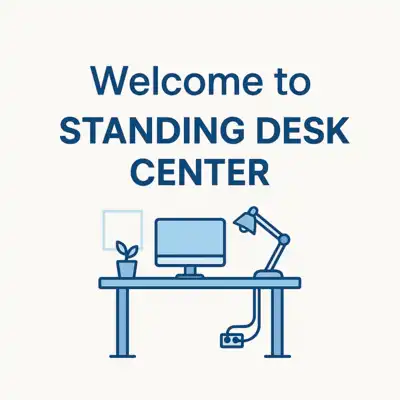Organize Cables on Your Desk
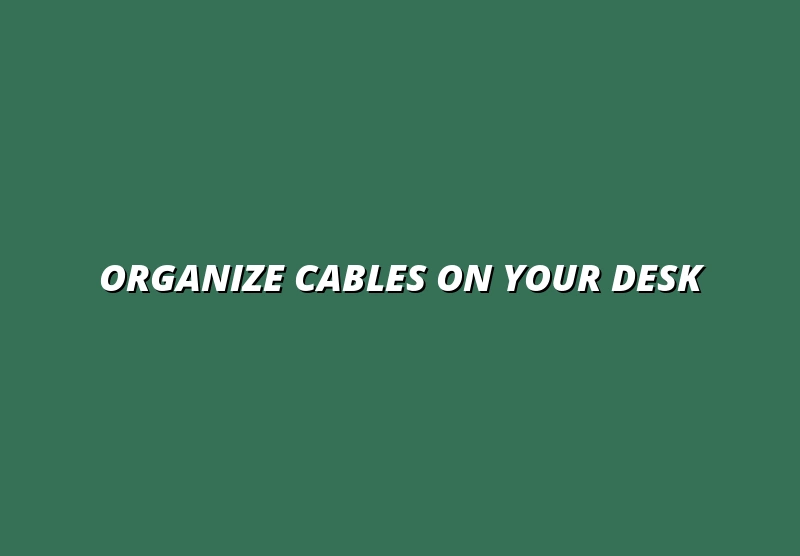
When was the last time you felt completely at ease at your workspace? A clutter-free environment not only enhances focus but can also be a game-changer for your productivity. In the quest for an organized workspace, customizing cable paths for your standing desk plays a pivotal role. Let’s explore the essential takeaways that can transform your experience.
What You Will Learn
- Recognize common cable management challenges, including tangling, accessibility, and wear and tear.
- Understand the safety and productivity benefits of effective cable routing in your workspace.
- Customize your cable paths based on your specific workspace needs and device configurations.
- Invest in quality cable management tools, such as clips, sleeves, and trays, to enhance organization.
- Explore additional products like cable management trays, sleeves, and grommets for a cleaner setup.
Cable Management Challenges and Benefits
Key insights on the common challenges faced in cable management and the benefits of effective routing for a more organized workspace.
Common Cable Management Challenges
- 1. Tangled Cables: Loose wires can easily become tangled.
- 2. Lack of Accessibility: Difficult to reach power sources.
- 3. Wear and Tear: Cables can get damaged from movement.
- 4. Aesthetic Issues: Messy cables look unprofessional.
Benefits of Effective Cable Routing
- 1. Improved Safety: Reduces the risk of tripping.
- 2. Enhanced Productivity: Better focus in a tidy workspace.
- 3. Professional Appearance: Creates a polished look.
- 4. Ease of Movement: Facilitates adjustments without hassle.
Understanding the Importance of Customizing Cable Paths for Standing Desks
If you’ve ever found yourself tangled in a web of wires while working at your standing desk, you know how crucial it is to have a well-planned cable management system. Customizing your cable paths not only improves aesthetics but also enhances functionality. At Standing Desk Center, we believe an organized workspace is vital for productivity and comfort. Let's dive into why customizing cable paths is essential.
First and foremost, many people face common challenges when it comes to cable management. This includes cluttered and tangled wires, difficulty accessing power outlets, and the risk of damaging cables due to movement. Recognizing these challenges is the first step in creating an effective cable management strategy. By taking time to customize your setup, you can eliminate these frustrations and create a more efficient workspace.
Identifying Common Cable Management Challenges
Understanding the common pitfalls of cable management is key to improving your workspace. Here’s a quick look at some typical challenges:
- Tangled Cables: Loose wires can easily become tangled, leading to chaos.
- Lack of Accessibility: Poor cable routing can make it difficult to reach power sources or USB ports.
- Wear and Tear: Cables that aren't properly secured can get damaged from constant movement.
- Aesthetic Issues: Messy cables can make your workspace look unprofessional and distracting.
Addressing these challenges will make your workspace more enjoyable and efficient. So, let’s move on to how effective cable routing can enhance both ergonomics and aesthetics.
Before we continue, let's address some frequently asked questions about customizing cable paths for standing desks:
FAQs: Customizing Cable Paths for Standing Desks
- Why is cable management important for standing desks?
- Effective cable management enhances safety by reducing tripping hazards, improves productivity by minimizing distractions, and creates a more professional appearance.
- What are common cable management challenges?
- Common challenges include tangled cables, difficulty accessing power outlets, cable wear and tear, and aesthetic issues caused by messy cables.
- What tools can I use to improve cable management?
- Useful tools include cable clips, sleeves, trays, and grommets. These tools help organize and conceal cables, creating a cleaner workspace.
- How can I customize cable paths for my specific workspace?
- Assess your workspace layout, device placements, and cable lengths. Identify areas where cables tend to tangle or obstruct your work, and then use appropriate tools to route and secure the cables.
- Where can I find more tips on cable management?
- Explore resources like simple cable management tips for more ideas and solutions.
The Benefits of Effective Cable Routing for Ergonomics and Aesthetics
When properly managed, your cables can significantly improve your workspace's ergonomics and aesthetics. Here’s how:
- Improved Safety: Clear pathways reduce the risk of tripping or snagging on cables, thereby enhancing safety.
- Enhanced Productivity: A tidy workspace allows for better focus, helping you stay on task and be more productive.
- Professional Appearance: Neatly routed cables create a polished look, impressing clients and colleagues alike.
- Ease of Movement: Customized paths facilitate easy adjustments to your standing desk without the hassle of cable entanglement.
By prioritizing effective cable routing, you not only create a visually appealing workspace but also enhance your overall work experience. It’s a win-win! Are you ready to take the next steps in customizing your standing desk setup? Stay tuned as we explore practical ways to achieve this in the following sections.
Quick Summary
Here's a brief recap of the key points discussed so far:
Subscribe
💡 Need a full cable management strategy for standing desks? Check out our complete guide to managing cords, motor wires and accessories. 👉 Read the Cable Management 101 Guide
- Customizing cable paths is essential for improving workspace aesthetics and functionality.
- Common challenges in cable management include tangled cables, lack of accessibility, and wear and tear.
- Effective cable routing enhances safety, productivity, and the professional appearance of your workspace.
Summarizing Effective Cable Management for Standing Desks
In our journey to create a more organized workspace, effective cable management for standing desks can’t be overlooked. It’s not just about tidiness; it significantly impacts your productivity and comfort. Let’s highlight some key takeaways that will help you customize your cable paths successfully! Proper cable management is also essential, and you can find clever ways to hide desk cables to achieve a cleaner look.
First, remember that every workspace is unique. Take the time to assess your specific needs and setup. Think about your devices, their cable lengths, and how frequently you adjust your desk height. Here are some crucial points to consider:
- Identify challenges: Understand where cables tend to tangle or obstruct your work.
- Invest in quality tools: Use cable clips, sleeves, and trays to simplify your organization.
- Prioritize ergonomics: Ensure cables don’t interfere with your movements while adjusting the desk.
Encouraging Reader Engagement: Share Your Own Tips and Experiences
Your experiences are invaluable! I invite you to share your tips and tricks for effective cable management. Have you found a particular product or method that changed the way you work? Engaging with fellow readers can spark new ideas and inspire innovation.
Don’t hesitate to leave a comment below with your thoughts. I love hearing how my fellow workspace enthusiasts, like you, tackle these common challenges. Together, we can build a community of support and creativity!
Next Steps for Your Standing Desk Cable Management Journey
Ready to take your standing desk cable management to the next level? The good news is there are plenty of products available that can enhance your setup even further. From organizing clips to advanced cable management systems, the right tools can make all the difference. Don't forget to check out organizing cables under your desk for more inspiration.
Consider exploring these product categories:
- Cable management trays: Great for hiding away excess cords.
- Cable sleeves: Ideal for bundling multiple cables together.
- Grommets: Help route power cables through your desk for a cleaner look.
Inviting Readers to Ask Questions and Seek Further Guidance
Have any questions about the steps we've discussed? Or maybe you're facing a unique challenge with your standing desk cable management? I'm here to help! Feel free to ask your questions or seek further guidance in the comments.
And let’s not forget about those office supplies and desk accessories that can enhance functionality! Think about items like:
- Ergonomic mouse pads: Supporting your wrist while you work.
- Monitor risers: Promoting better posture and reducing neck strain.
- Desk organizers: Keeping frequently used items within reach.
By investing in the right products and maintaining an open dialogue, you can ensure your standing desk setup remains efficient and enjoyable!
Recap of Key Points
Here is a quick recap of the important points discussed in the article:
- Identify Common Challenges: Understand issues like tangled cables, lack of accessibility, and wear and tear to create a better cable management strategy.
- Enhance Safety and Productivity: Proper cable routing improves safety, enhances productivity, and creates a professional appearance in your workspace.
- Assess Your Unique Needs: Evaluate your workspace layout, device placements, and cable lengths to customize your setup effectively.
- Invest in Quality Tools: Utilize cable clips, sleeves, and trays to streamline organization and reduce clutter.
- Prioritize Ergonomics: Make sure cables are positioned in a way that does not hinder movement when adjusting your standing desk.
- Explore Additional Products: Consider using cable management trays, sleeves, and grommets to further enhance your cable organization.
Popular Posts
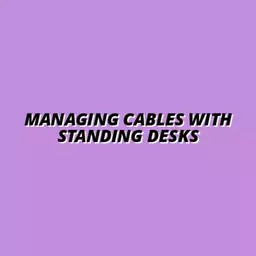 Consider this: a well-organized workspace can boost your productivity by up to 20%. How you manage y
Consider this: a well-organized workspace can boost your productivity by up to 20%. How you manage y
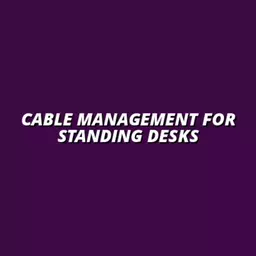 In today’s fast-paced work environments, the setup of your workspace can significantly affect your
In today’s fast-paced work environments, the setup of your workspace can significantly affect your
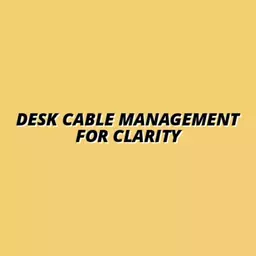 Are you aware that a clutter-free workspace can significantly enhance your productivity? Desk cable
Are you aware that a clutter-free workspace can significantly enhance your productivity? Desk cable
 Research shows that a cluttered workspace can significantly reduce productivity. As you think about
Research shows that a cluttered workspace can significantly reduce productivity. As you think about

